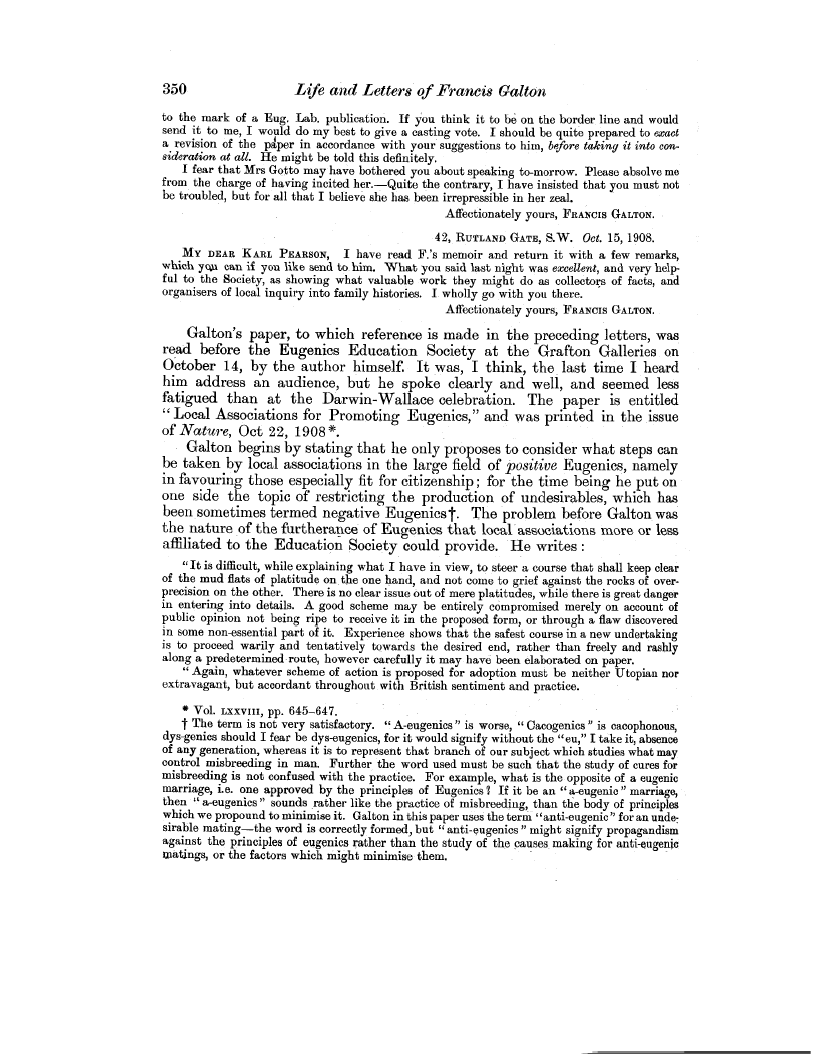| ||||||

OCR Rendition - approximate
350 Life and Letters of Francis Galton to the mark of a Eug. Lab. publication. If you think it to be on the border line and would send it to me, I would do my best to give a casting vote. I should be quite prepared to exact a revision of the paper in accordance with your suggestions to him, before taking it into consideration at all. He might be told this definitely. I fear that Mrs Gotto may have bothered you about speaking to-morrow. Please absolve me from the charge of having incited her.-Quite the contrary, I have insisted that you must not be troubled, but for all that I believe she has been irrepressible in her zeal. Affectionately yours, FRANCIS GALTON. 42, RUTLAND GATE, S.W. Oct. 15, 1908. MY DEAR KARL PEARSON, I have read F.'s memoir and return it with a few remarks, which you can if you like send to him. What you said last night was excellent, and very helpful to the Society, as showing what valuable work they might do as collectors of facts, and organisers of local inquiry into family histories. I wholly go with you there. Affectionately yours, FRANCIS GALTON. Galton's paper, to which reference is made in the preceding letters, was read before the Eugenics Education Society at the Grafton Galleries on October 14, by the author himself. It was, I think, the_ last time I heard him address an audience, but he spoke clearly and well, and seemed less fatigued than at the Darwin-Wallace celebration. The paper is entitled " Local Associations for Promoting Eugenics," and was printed in the issue of Nature, Oct 22, 1908 *. Galton begins by stating that he only proposes to consider what steps can be taken by local associations in the large field of positive Eugenics, namely in favouring those especially fit for citizenship ; for the time being he put on one side the topic of restricting the production of undesirables, which has been sometimes termed negative Eugenics'. The problem before Galton was the nature of the furtherance of Eugenics that local associations more or less affiliated to the Education Society could provide. He writes "It is difficult, while explaining what I have in view, to steer a course that shall keep clear of the mud flats of platitude on the one hand, and not come to grief against the rocks of overprecision on the other. There is no clear issue out of mere platitudes, while there is great danger in entering into details. A good scheme may be entirely compromised merely on account of public opinion not being ripe to receive it in the proposed form, or through a flaw discovered in some non-essential part of it. Experience shows that the safest course in a new undertaking is to proceed warily and tentatively towards the desired end, rather than freely and rashly along a predetermined route, however carefully it may have been elaborated on paper. " Again, whatever scheme of action is proposed for adoption must be neither Utopian nor extravagant, but accordant throughout with British sentiment and practice. * Vol. LXXVIII, pp. 645-647. t The term is not very satisfactory. "A-eugenics" is worse, `1Cacogenics" is cacophonous, dys-genics should I fear be dys-eugenics, for it would signify without the "eu," I take it, absence of any generation, whereas it is to represent that branch of our subject which studies what may control misbreeding in man. Further the word used must be such that the study of cures for misbreeding is not confused with the practice. For example, what is the opposite of a eugenic marriage, i. e. one approved by the principles of Eugenics? If it be an " a-eugenic " marriage, then " a-eugenics " sounds rather like the practice of misbreeding, than the body of principles which we propound to minimise it. Galton in this paper uses the term "anti-eugenic" for an undesirable mating-the word is correctly formed, but "anti-eugenics " might signify propagandism against the principles of eugenics rather than the study of the causes, making for anti-eugenic i atings, or the factors which might minimise them.
|